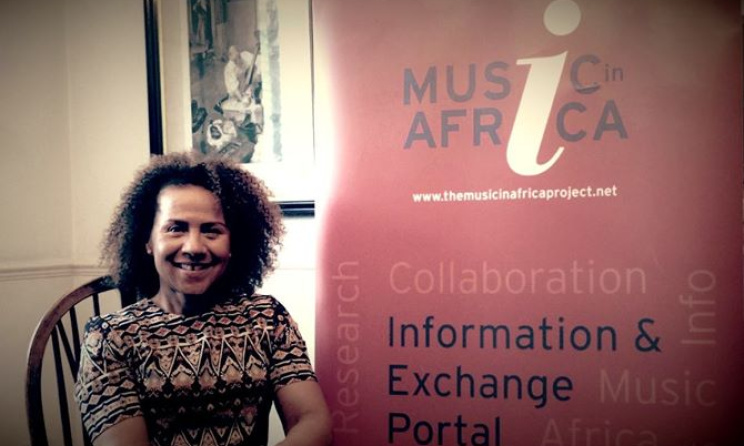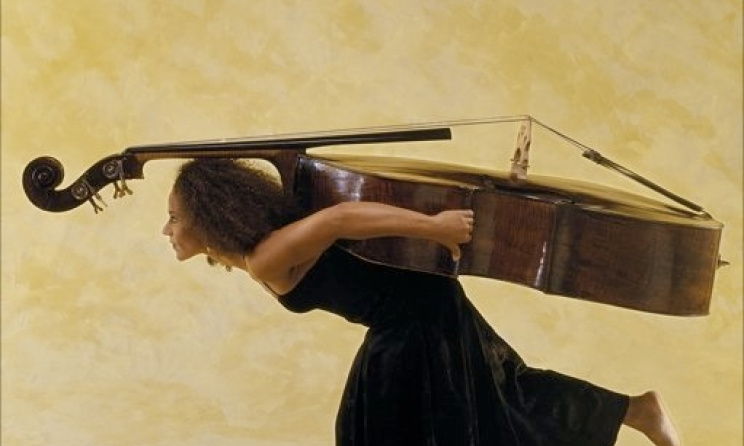Chi-chi Nwanoku: A classical legacy and an African heritage
A short biography of Chi-chi Nwanoku MBE, world-renowned classical baroque bassist and Professor of Music, covering her life, influences and deep connections to her African roots.
 Chi-chi Nwanoku MBE
Chi-chi Nwanoku MBE Chi-chi Nwanoku. Image by Eric Richmond
Chi-chi Nwanoku. Image by Eric Richmond
Dr Michael Nwanoku adjusted himself in his seat as the next announcement was about to be made. He and his wife Margaret had looked forward to this day for several weeks and he had made the point of wearing his full Igbo Chief’s regalia, complete with the “Ozo” Cap and Coral beads. After all it was not every day one visited Buckingham Palace, neither was it every day that one witnessed one’s daughter receiving the award of a national honour from Queen Elizabeth II herself. His daughter, through sheer talent and hard work, had conquered years of adversity and some might say, prejudice to emerge as one of Britain’s finest Classical Musicians and academics. Almost in the same way, he and his Irish wife had conquered racism and ignorance in the course of their long and happy marriage. Dr and Mrs Nwanoku had too many good reasons to be proud of their eldest daughter, the talented Chi-chi Nwanoku, now Member of the Order of the British Empire (MBE) as she received her award from the Queen.
Chinyere (Chi-chi) Adah Nwanoku, was born in Fulham, London, in 1956 to Michael Nwanoku and the former Margaret Ivey. Her parents had met at a chance encounter at a dance in London, in 1955 and were inseparable from then on and they got married shortly afterwards. The young couple faced prejudice on account of their Interracial relationship at the time, recalling a period in Britain, where signs on Houses, advertising lodging vacancies, would boldly state, “No blacks, no dogs, no Irish”. The couple humorously recalled thanking God they didn’t have a dog (since they were both black and Irish).
Even before she reached school age, providence took her to back to her fatherland, when her father moved the family back in 1957, upon being told of his mother’s impending death. They returned to Nigeria spending 2 years, which she recounted her mother as being extremely happy and feeling more accepted than she had been anywhere else. The family however returned to the UK, upon the birth of her twin siblings in 1959, settling in Kentish Town, North London. She started her primary education in London, after having already been taught to read by her mother. The family later moved to Kent, as her father continued with his Medical studies. Her musical journey started on one fateful day at the age of 7, in 1963, when on a visit to a neighbour’s house she was introduced to the Piano and became a committed student. Her mother in deference to her daughters passionate commitment, signed her up with a Piano Teacher to enhance her skills. She also recalled receiving a gift of the Piano she had played at her neighbours house, which had generously been given to her a week after she started her Piano lessons. She soon became a highly skilful Pianist, and one of her School’s Music stars.
At the of eight, she was also scouted for athletics training by the Coach of Canterbury Athletics Club, the Sports Scientist- Dr John Norris, who identified the talents of a future sprinting champion in her. He managed to convince her parents to allow him coach her. She very soon became one of Britain’s fastest Sprinters and rated as having the fastest start in British athletics, at the age of 15. After having missed out on qualification for the 1972 Munich Olympics, she moved to Berkshire, England with her parents, where she attended Kendrick Girls Grammar School, and joined Reading Athletics Club, where she was being prepared the Montreal Olympics of 1976, alongside Olympic Bronze Medallist Beverley Goddard (Callendar). She also joined the Reading Ladies Football Club and fatefully in a match in 1973, was to suffer a serious Injury, as a result of which she ended up in Hospital for two weeks and which effectively signalled the end of her athletics career.
The devastated young girl, was however comforted by her parents and her School’s Music Teacher- John Dusaint, who thought to engage her energy after the loss of athletics, by introducing her to an Instrument called the Classical Bass, which she had never seen before. Her doubts about her ability to play this massive instrument were allayed by DuSaint, who reminded her that she had never failed at anything she put her mind to.
Nwanoku duly threw herself into playing the Classical Bass, which was one the less popular Classical Instruments. The transfer was not difficult, as she was already an excellent Pianist, and the years of discipline learnt in her athletic career were easily transferred to her studentship in the Classical Bass. Her perspective on this was telling, in her own words: “I saw this as an opportunity and I grabbed it with both hands, I didn’t give myself time to grieve”. Upon completing her secondary school education, her ambition was to attend the Royal Academy of Music. However common-sense dictated that she was not yet prepared to apply for admission to the Academy to study Bass, because she had only been playing the Instrument for a short time and might have had difficulties, what with the extremely high standards of admission and the cut-throat competition for places. It was thus decided that she should take preparatory classes in Cambridge, funded by the Green Girls Foundation in Cambridge, with some financial assistance for rent from her parents. Inspite of this, she had to work in all her spare time to raise money for her feeding. She also played in a Classical Chamber Orchestra, gaining the most valuable experience.
After two years, she applied for a place at the Royal Academy of Music and passed the qualifying exams, incredibly with the least qualifying marks. On paper she was the least rated, because her counterparts had been playing their Instruments all their lives, whereas she had barely 3 years experience on the Bass. Undeterred, she started her studies and a particularly unpleasant encounter, underscored her early experience. At a concert in which she performed at the Academy, attended by her parents, one of her Tutors had told her parents quite categorically, that even after her education, she would not have a future career, “playing a man’s Instrument”. What was also unsaid was that she was possibly the only black Classical Instrumentalist at the time. Her mother was quite distressed at this comment, but her father had a smile on his face, as he recounted the Tutor’s comments to her. Her emotions mirrored those of her fathers, he knew, as she did, that she was absolutely determined to succeed and that she would certainly do so.
Her father’s confidence and indeed hers, was not misplaced. She graduated after four years as the best graduating student in the Double Bass, winning the Eugene Croft Prize, as well as the Principal’s prize. This was not a bad result for a young girl rated at the bottom of the qualification list and told by her Tutor that she had no future in the profession. The qualifications of the Royal Academy of Music were of Degree status, the Academy being part of Kings College, London. She obtained a Licentiate of the Royal Academy of Music (LRAM) in 1986. She also obtained a practical degree, the Associate of the Royal College of Music (ARCOM), also graduating with a distinction (scoring over 90% in the final exams). Five and ten years later in 1991 and 1996, she was awarded Associate of Royal Academy of Music and Fellow of the Royal Academy of Music respectively, being merit-based awards for exceptional former students and practitioners.
Even after completing her academic studies, pursuing her persistent quest for self-improvement, she applied for further practical training with Italian virtuoso Bassist Franco Petrarchi, where she studied for a few years, returning to the United Kingdom in 1988. Upon her return, she slowly but surely became one of England’s most sought after Classical Bassists, in constant demand in the UK and Intrnationally. She started out with the London Mozart Players. She was later to play with some of the UK and Europe;s finest Orchestra’s such as the Academy of St Martin’s-in-the-Fields, English Baroque Soloists, London Classical Players and the Orchestre Revolutionnaire et Romantique. She famously performed at the UK premiere of Ferneyhough’s ‘Trittico per G.S.’ for solo double bass in 1996. Her work could also be heard on the recording of Alexander Goehr’s ‘Sing Ariel’, conducted by Oliver Knussen.
She was to return to the Institution that groomed her, becoming a Professor of Historical Bass Studies, at the Royal Academy of Music. Her talents and knowledge were also employed in Media, when she served as a BBC broadcaster, presenting BBC Radio 3 Requests programme for four years. She was also a guest on the BBC TV Proms programme, as well as a member of the BBC’s Classical Star Jury.
She was a co-founder of the Orchestra of the Age of Enlightenment in 1991. This Orchestra was formed by a group of highly distinguished, but unconventional Classical Musicians, who sought to throw away the rule book and experiment, whilst staying faithful to the period specific discipline of their Instruments. This highly sought after Orchestra has enjoyed residencies at the Southbank Centre, London and Glyndebourne Opera Festival and recorded a number of albums. She was also co-founder of the Endymion Ensemble.
In her own right, she recorded several albums, starting with her critically acclaimed debut in 2000, under the Hyperion label. Others included recordings of Schubert’s ‘Trout’ Quintet, as well as recordings of the Schubert Octet, Beethoven Septet, Rossini String Sonatas (a Quattro) and Boccherini.
She was also appointed to the Boards of the National Youth Orchestra of Great Britain, Association of British Orchestras, and Royal Philharmonic Society. She was appointed Patron of Kuumba Youth Music, the Mayor of London’s Fund for Young Musicians, Music Preserved, Kew Music Festival and the Cherubim Trust.
It was thus no surprise to many, when this talented woman was listed in 2001, for the award of Member of the Order of the British Empire, in the Queens Birthday Honours. Her proud parents witnessed their daughters Investiture by Queen Elizabeth at Buckingham Palace. This was particularly moving for Nwanoku, as her parents passed away a few years later, however she was grateful that they had the opportunity to witness her success in a profession that they had selflessly supported her, through all her life.
In the midst of all this success however lies a woman, with strong and proud connections to her fatherland, specifically Ngor-Okpala in Eziama Imo State. She proudly recollects, learning Igbo language fluently at a young age. She also recalls memories of holidays spent at Ngor-Okpala, (where her parents retired), especially at parties and at home to the background of Highlife Music from the Peacocks and Oriental Brothers amongst others. A fitting symbolism of this being the introductory “Nkwa” music proudly and boldly imposed in the intro to the documentary of her life “Tales from the Bassline”. Chi-chi Nwanoku continues her excellent work today, as the United Kingdom’s finest and indeed one of the world’s finest Classical Bassists, proud of the ancestral roots of her Igbo father and Irish mother, in the same way that her life’s journey should inspire pride in her country-men.




























Commentaires
s'identifier or register to post comments